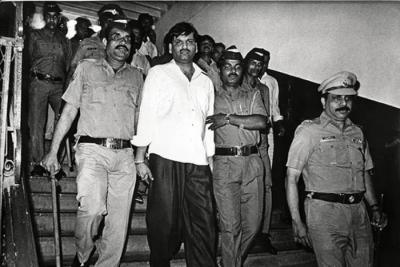Harshad Mehta came to Mumbai with 40rs in his pocket and ended up doing a 5000 crore scam
By Lokmat English Desk | Published: October 21, 2020 07:47 PM2020-10-21T19:47:05+5:302020-10-21T19:47:05+5:30

The securities scam of 1992, involving infamous stockbroker Harshad Shantilal Mehta, led to sweeping stock market reforms and revealed systemic loopholes in the country's banking.

A new web series on SonyLiv 'Scam 1992: The Harshad Mehta Story' recounts how Harshad Mehta manipulated the Indian stock market using illegal funds obtained from banks.

While stock trading has become secure over the years with an expansion of Securities and Exchange Board of India’s (Sebi) regulatory powers, gaping loopholes in the country's banking system are still exploited by wealthy businessmen and individuals to defraud financial institutions.

Harshad Mehta, a Bombay-based broker, had become a familiar name on Dalal Street during the early 1990s before he was charged with the securities scam in 1992, bringing an end to his bull run.

Harshad Mehta was often referred to as the 'Big Bull' of Dalal Street or the 'Amitabh Bachchan' of the Indian stock market - a tag that he earned due to his flamboyant lifestyle after becoming a celebrity-status stockbroker.

As many financial journalists who covered the scam recall, Harshad Mehta successfully managed to manipulate stocks by illegally obtaining money from several banks using fake bank receipts. During the period between April 1991 and 1992, Sensex surged from just over 1,000 points to almost 4,500 points. This was also the period when Harshad Mehta diverted thousands of crores obtained from banks into the stock market. When the scam was exposed by veteran journalist Sucheta Dalal, it was revealed how Harshad Mehta had exploited banking loopholes to manipulate stocks. Soon after the scam was exposed, the stock market saw a bloodbath which deeply wounded Mehta's holdings.

He created a vicious cycle of fraud involving big names such as the State Bank of India (SBI) and the National Housing Bank (NHB). The securities scam of 1992 worth nearly Rs 4,000 crore - way over Rs 20,000 crore when adjusted for inflation in today's date - resulted in transformational changes in the stock market.Stricter laws were introduced to widen the regulatory powers of the Sebi. The stock market saw sweeping changes like the reduction of the settlement cycle, minimum balance and online transactions among other measures.But that was just one part of the scam. Mehta had also taken advantage of gaps in the country's banking sector - some that exist even today.























